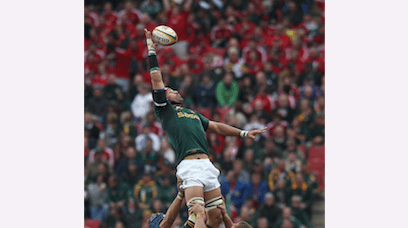A refereeing mistake has inflamed fans in South Africa, who say it led to the weekend’s 15-29 loss to New Zealand, who took the lead in the Rugby Championship.
Early in the match in Auckland on Saturday Sept 14, Springboks hooker Bismarck du Plessis was sent to the sin bin for a high tackle on All Black flyhalf Dan Carter, who will be out for an estimated four weeks.
Du Plessis was given a second yellow card minutes into the second half, for leading with the elbow when attacking. A second yellow brings an automatic red card. The ’Boks played most of the second half without one of their best players.
The problem is, the tackle on Carter was legal. The referee sought advice from the video-referee on a mass scuffle that followed the du Plessis tackle. French referee Romain Poite said there was no need to rule on the tackle itself.
The replay showed the tackle was fair, infuriating South African fans at the ground and watching throughout the world.
The cold fact is the referee made a mistake, costing the Springboks one player for 10 minutes. Injustice aside, du Plessis was on notice—yet he offended again, consequently the ’Boks lost him.
Most Springboks fans read these facts differently. They see injustice, at least—and possibly conspiracy.
South African fans are still angry about losing to Australia in the 2011 World Cup, due they say to NZ referee Bryce Lawrence, who was poor. The conspiracy belief is that the ’Boks were the biggest threat to NZ in the tournament, so had to be eliminated.
Lawrence, 43, retired from refereeing last year, saying the vitriol he received from South African fans was the reason.
He also said the Australian and South African rugby unions opposed him “behind the scenes”.
Last Saturday’s match was a showdown between the all-conquering All Blacks and their greatest foe, the reborn Springboks. Many people backed the ’Boks to win at Eden Park for the first time since 1937.
Rankings aside, the winner would be viewed as the top team in the world. If the ’Boks had won, they would almost certainly go on to win the return match at home in Johannesburg on Oct 6 and take out the championship—finally re-asserting their dominance over the All Blacks.
Springboks fans were buoyant leading into the game. South Africa had just demolished Australia, and the team was starting to play the traditional, dominating Springboks game – with the forwards looking bigger, stronger and faster than their opponents.
The greatest fear was ... the referee. When that fear was given substance by the first yellow card, the fans were furious. After all, du Plessis was dominating the game.
When the red card was delivered, the matter was settled. The ’Boks would be denied victory by hook or by crook.
The International Rugby Board judiciary has exonerated du Plessis on the red card, but maintained the second yellow card.
The fury of South African fans can be personified by former Springboks coach and player Nick Mallet, who said the referee “ruined the game” with a “shocking decision”.
“A match of this quality deserved to have 15 players on the field, for the whole game,” he said, unless there was obvious foul play.
The IRB said Poite had made a mistake, just as coaches and players made mistakes.
An animated Mallet refuted this, saying Poite saw a replay of the tackle and the following scuffle before issuing the yellow card.
Everybody at the ground and all the fans watching on TV saw the replay – and saw that the du Plessis tackle was legal. The video-referee saw it. At least one of the two assistant referees must have seen it, if not referee Poite himself.
When the video-referee finally ruled that no offences had been committed in the mass scuffle, Poite sent du Plessis to the sin-bin for an offence he had not committed.
The IRB response is that everybody makes mistakes. Nick Mallet is right to say that’s not good enough.
Peter Lalanabaravi is a rugby writer with over 30 years experience.




